Oliver Michael Todd in Conversation with Thomas
Hauerslev
|
Read more
at in70mm.com The 70mm Newsletter |
| Transcribed and prepared for in70mm.com by Margaret Weedon and Mark Lyndon, London. Interview took place 05.03.2014 at the former Todd-AO cinema 3 Falke Bio in Copenhagen. With additional questions by Willem Bouwmeester, Randy Gitsch & Johan C. M. Wolthuis. With thanks to the Falkoner Center for letting us use the room and Erik Hamre for always being enthusiastic | Date: 27.04.2014 |
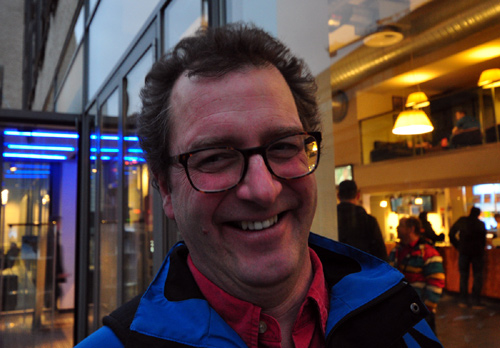 Oliver
Michael Todd in Copenhagen, March 2014. Image by Thomas Hauerslev Oliver
Michael Todd in Copenhagen, March 2014. Image by Thomas HauerslevOMT: My name - Oliver Michael Todd – came about as my father, being Mike Todd Junior, claims he could not name someone "the third"; so I got Oliver as a way of saying "O" Michael Todd as opposed to Michael Todd the third. I was born in New York and lived there the first six years of my life and then we moved to rural Ireland which is where I consider home these days. I had a simple pleasant early childhood living in a well to do suburb. Upon finishing secondary school in Ireland, I went to university in the US and actually took a little detour from university and went to Los Angeles and had a dabble in the film business there. Later I became a school teacher and over a series of years, and in different locations, I eventually found myself lucky enough to find a job in Copenhagen. That is how I have ended up here; and have lived here for some few years. THa: Tell me a little bit about your childhood in New York – what do you remember? OMT: We lived in a suburb in I guess quite a well to do area called Westchester County, north of New York City. At that point my father was still running an office in New York City. I was very young at the time so not very conscious of what he was doing but, certainly in the aftermath, have heard stories about him running an office. My impression is of a publicity office and a production office but not by any means major film productions. He did some television specials - "Around the World of Mike Todd" (September 1968), and comedy albums, amongst other things; he was in the midst of the entertainment agencies and production companies area of business in New York. |
More
in 70mm reading: The Passing of Oliver Michael Todd Mike Todd, Jr. Interview The Lingering Reek of “Smell-O-Vision” Cinerama Inc. Scans "Holiday In Spain" The Tale of Old Whiff "Holiday in Spain" Screens in Spain "Scent of Mystery" Some thoughts after a 2004 screening The facts about "Around the World in 80 Days" 65mm negatives Discoveries from the "Around the World in 80 Days" Collection by Brian Travis "Around the World in 80 Days" 70mm & Cinestage Seasons Mr. Todd visits in70mm.com Mike Todd, Jr. Obituary You are in the Show with Todd-AO Susan M Todd 3 Falke Bio, The First Todd-AO Theatre in Scandinavia |
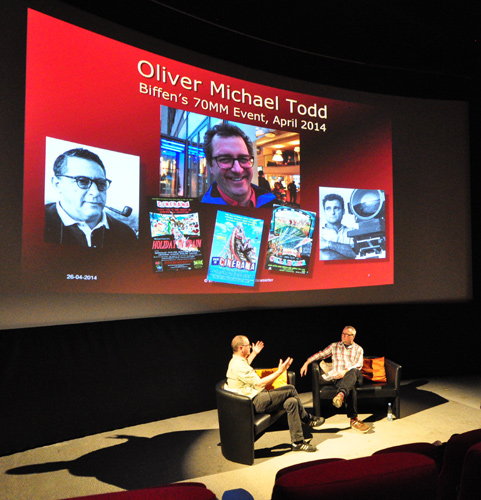 Oliver
Todd in conversation with Thomas Hauerslev during Biffen's 70MM Event 26.
April 2014. Image by Orla Nielsen Oliver
Todd in conversation with Thomas Hauerslev during Biffen's 70MM Event 26.
April 2014. Image by Orla NielsenTHa: Tell me about your interests and about your work – you mentioned that you were a school teacher: OMT: I am a school teacher. I found myself becoming a teacher in part because I went into drama. I took a year out of university - went to LA got some work in production, set decoration, and other sorts of menial tasks and was quite unsuccessfully plying my trade as an actor at the same time. That is primarily how it started, although in the midst, I found I had a leaning towards language, and I became a language and literature teacher, working with literature for English speakers. Actually, my Dad did put me in touch with a bunch of very successful and prominent producers; and there I was a 19 year old kid with perhaps a name or connection by virtue of my father, or my grandfather - certainly my grandfather and Elizabeth Taylor; but those producers did not know who I was and I did not really know who they were. I remember one in particular, Ted Mann who owned the Mann’s Chinese theatre, and I thought - ‘of course there are a million actors walking round with their CVs and head shots trying to get work, and I have a meeting with one of the most powerful and successful producers in LA.’ There was I going up to the 35th floor of a megapolis building to meet a producer who was not a casting agent; he was not going to cast me in anything to do with any of his productions; but my father said – “Oh yes, go and talk to Ted Mann” . I walked in and he was very pleasant; he said “Your Dad is a very nice guy” - and whatever else; “but I do not understand why you are standing here talking to me” (!) - he gave me two free tickets to one of his many theatres in Los Angeles and I walked out thinking “Wow, that was probably a much more important and powerful movie person than I shall ever meet again”. On completing my year out of university, I went back to school and finished. I spent a couple of years doing radio and amateur or community theatre in various places. I first worked in Texas and then I moved to the North East and worked in an upstate New York radio station for a while before moving to Boston. I was not making ends meet doing occasional disc jockey jobs; paid DJ at weddings, anniversaries, and things like that; doing theatre that did not pay very well if at all and, in the midst of that, I picked up some work as private tutor and test preparation tutoring, and found myself liking that very much. Thus, maybe four or five years after finishing university, I decided I had better make a decision: am I really going to try this entertainment business world, or do I want a real job? Which lead me into getting a degree in education and English and then becoming a school teacher. In Ireland high school is a five year education and during that time in my small school there was no regular drama department; but we did have one production - (I guess they hired someone from outside to direct and produce) – it was “My Fair Lady”. I got the lead role playing the Rex Harrison part which, like him, did not involve me trying to sing! - of course I just had to speak my way through the songs. During this time, whilst having dinner one evening with my father, he said to me – “You are the only person in this family that I think could go into show business” which suggested to me (not very flatteringly?) that I may have some ability for it but, much more, that show business is not really a reliable line of work, and that probably I should avoid it if at all possible! |
|
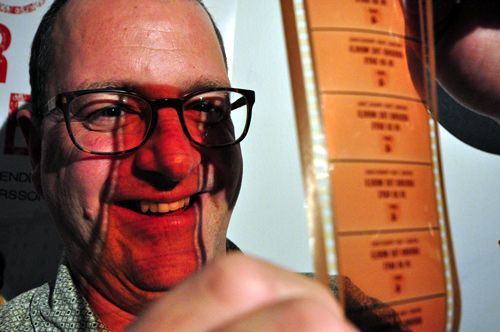 Oliver
Todd in Aalborg (Denmark) 26. April 2014 with a piece of 70mm film from his
granddad's "Around the World in 80 Days". Image by Thomas Hauerslev Oliver
Todd in Aalborg (Denmark) 26. April 2014 with a piece of 70mm film from his
granddad's "Around the World in 80 Days". Image by Thomas HauerslevTHa: how did you end up in Copenhagen – it could have been anywhere? OMT: It was really a conscious choice. I had worked for quite a while in the US teaching; I was really lucky and was given the opportunity to take a year of leave several times and I worked in various countries – in China and Brazil, and Portugal, and other places and, just before I came here, I was trying to work on another business and had stopped teaching. That business did not work out and I decided to get back into teaching because that is my vocation; if at all possible wanted to move back to Europe. I applied for some jobs and just by pure chance Copenhagen came up, and it was the one job I was really honestly praying for, and I got it. I had spent a summer in Copenhagen some ten years ago and I just thought that it is one of the best cities I have ever been to and I would grab the opportunity to live there if it ever came up. THa: and how do you find living in Copenhagen? OMT: Excellent, I really still believe it is one of, if not the, best city in the world to live in. THa: Why is that? I am just curious, having been a Copenhagen citizen for 50 years. I like it … OMT: I would say I probably have a somewhat different perspective coming from the United States and also as I grew up in a really rural place and then I spent a decade or so living in an American city, in Boston, there is something about Copenhagen that is extraordinarily ‘humanly scaled’, and I mean that in terms of the size, transportation, accessibility. There is a lot of nice pleasant public space, it is not particularly crowded, or polluted; neither do I notice the usual difficulties and disadvantages of urban life, i.e. sensory overload and noise, pollution and crowding. Copenhagen does not suffer from most of those things but it does have the benefits of urban life, which is cultural events and a good positive and active energy - things like that. I should just put in a word for the political, economic ideology. I think the Scandinavian countries have it sorted out better than most in the world; that feels good and evident to me in my day to day life. So, sorry to make a promo of Copenhagen, but it certainly suits me. THa: I like it, but it is nice to hear it from our guests. You have been all over the world but you settle for Copenhagen, so it is nice to hear that. |
|
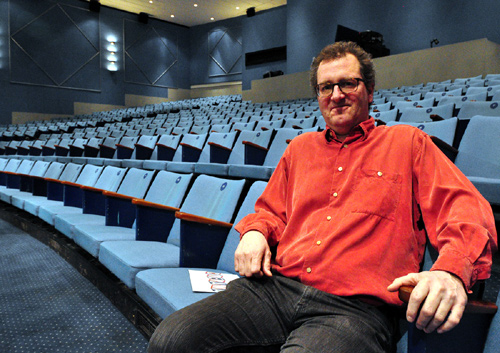 Oliver
Todd at the former Todd-AO cinema in Copenhagen, the 3 Falke Bio. Image
by Thomas Hauerslev Oliver
Todd at the former Todd-AO cinema in Copenhagen, the 3 Falke Bio. Image
by Thomas HauerslevTHa: Did you try working in the movie industry, and did the top name open any doors for you? OMT: Yes, although it may be more illuminating to talk about it to a few of my siblings - three of whom had various years and degrees of time in the film industry. My experience is mostly what I have said. I did that year in Los Angeles and, although I did get work, I do not think it was as much “Todd” as indirect references; people who my father had known, or some of my older siblings had worked with whom I got in touch with, that opened doors. In some sense the Todd name on the basis of my grandfather was both sort of removed, and out of date, and also above a level where it was going to be of any significance to me looking for a job as an art department production assistant (which is what I did) or getting any “ins” as far as casting calls, or actual work as an actor. My eldest brother, who lived in rural Ireland for only maybe a year, moved back to New York and through my father definitely got work immediately. He got some pretty spectacular jobs; he worked on “Kramer vs Kramer”, “Saturday Night Fever”; some of the real block buster movies of that time. But I think he became somewhat disenchanted; I am not sure exactly why: he may have been doing fairly low level production work, but I do know that doors were opened for him in that he got work right away without any experience, and had good opportunities working with really successful production companies. One of my other siblings, a sister, spent probably ten or fifteen years as a unit stills photographer and I do not know to what degree that was related to the family name or the family business because I do not think there was much interaction or contact between her and my father, and some triangulation in terms of the production companies; but I would say she really earned her stripes, and work. She also became somewhat disillusioned and has ended up going into an entirely different line of work after a long and quite successful career as a unit stills photographer. I have not really touched the film business since my year in Los Angeles. I may have done so if I had thought it was accessible; I did some TV work in Boston and, as I mentioned, radio work in up-state New York and in Boston, but my contact with the film business has been very indirect just by being friends with someone who is in the UK film industry, and part of a family of very successful production people, but I have kept my hands clean in terms of working in the industry. |
|
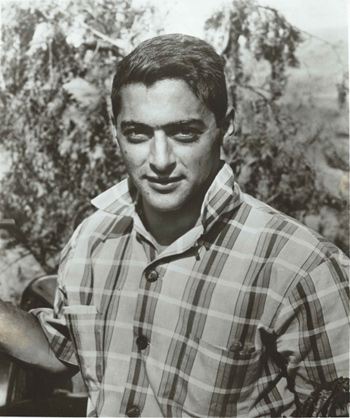 Mike
Todd, Jr. private still from Susan Todd's collection Mike
Todd, Jr. private still from Susan Todd's collectionTHa: my next question might be irrelevant in that respect then – but – did you ever dream of making movies like your dad did or even like your grandfather? OMT: The simple answer is no – although when I was fifteen, I really did dream that I was going to be a movie star, but I was going to be a movie star who does not work that much with the naiveté of a fifteen year old! I was also someone who grew up in a household that was very reminiscent of huge film, or even Broadway production success, so I had no idea of the amount of labour, business, effort or what is really involved with making it in any sense in the film industry. I had my fantasy of being a film star who would maybe shoot a movie maybe once every couple of years just to keep his hand in, but through that experience in Los Angeles I realized that the business is absolutely soul drenching. You have got to really work and work and work to get much of anything accomplished; whether that is on one side of the camera or the other - and I suppose I did not have either the passion or the work ethic to make my way through that. I still see that when I talk to people who are very successful. They are independent film producers in the UK, they never get to stop and say, OK, I just made a very successful film I will take some time off. It is a treadmill of effort and input. In that sense I see that in my father’s story and in his father’s story - in that his father really did keep doing it and failing and succeeding and failing and succeeding - and ended up with a huge success. But there is also the old cliché that goes something like “success is just a combination of how ever many failures until you make a success”. My father had a sort of similar experience in that he did not have that many successes and stepped back from the industry fairly early on; although he kept a toe in the door he did not actually end up producing very much in the latter half of his life. |
|
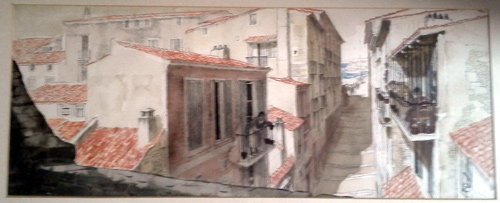 "Scent
of Mystery" water colour story board by Vincent Korda. Picture by
Susan Todd "Scent
of Mystery" water colour story board by Vincent Korda. Picture by
Susan ToddTHa: You have a large family; a lot of sisters and brothers, and very briefly, are you talking to them over Skype and other communication? since you are in Copenhagen I assume they are in the States OMT: Yes, we are in touch a lot, but there is an Irish part of the family as well, although the older siblings are now all in the US, and we are in very regular contact. THa: Do you have any contact with Liza at all? - [Elizabeth Frances Todd / Liza Todd Burton, 6 August 1957], OMT: Two of my sisters are more in touch than I am; one of them lives fairly near her and the other is in contact, and on good friendly terms; there is still a connection there. Our ages are somewhat odd in that my oldest brother is older than his aunt, because of course my grandfather and Elizabeth Taylor had a child when my grandfather was in his late forties and she was mid-twenties at the time. I think Elizabeth was about the same age as my father who at that point had been married and had one or maybe even two kids when his half, or step-sister, was born. So we have an aunt, or step aunt, who is much the same generation as we are and even younger than some of us. She also, it seems to me, had moved aside from that whole world of film and glamour; one of my other siblings is in good touch and lives very near to the Wilding family - Christopher & Michael - Elizabeth Taylor’s first brood of children. THa: When and how did you learn that your daddy and granddad were famous movie people? For you when you were growing up this was daddy, but at some point you must have realized there was an interesting background. OMT: That is a really good question and not one that I have thought about… when did I find out? Well, in some sense I would have known it, however unconsciously, all the time and that is in part without necessarily having known what they were. That is, the film “Around the World in 80 Days” that my grandfather produced won seven Academy Awards or maybe eight. I do not know what the procedure for something like that is, I gather the producer gets the statue if it is a Best Picture Award, but there were a few other ones that were more technical; such as “Sound Editing” or “Costume”, etc.. I remember as a child seeing these things literally on the mantelpiece in the house and it became evident that they were the Academy Awards! I am not sure if they were originals or not, but that was certainly a pretty remarkable thing to have in one’s childhood home. I do not have a whole lot of memory of our life in the US, but I am sure it was really evident there and then. My Dad was driving from this suburban home to an office in New York and it was definitely show business. How famous or celebrity his life was I am not really aware but, as soon as we moved to Ireland, there was a fairly regular topic of conversation at the dinner table with reference to either his father, or some other celebrity. My sensors picked up on the way he reminisced that he rubbed shoulders with a lot of fairly famous and big named people in the entertainment industry - famous or big names for him at least and some of whom I would have recognized. I was about ten or twelve when I picked up on him talking about playing pool with Peter Falk, who at that point was starring in Colombo; and I began to realize that he really had a fairly big life back in the days when we were living in the United States. |
|
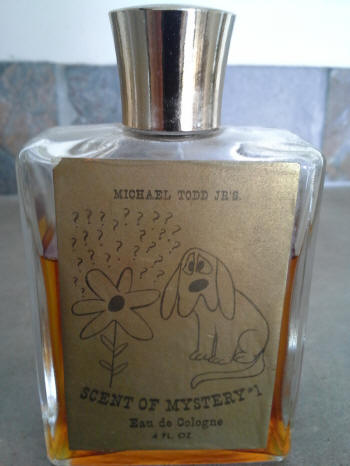 "Scent
of Mystery" perfume. Picture by Susan Todd "Scent
of Mystery" perfume. Picture by Susan ToddTHa: That leads me to the next question: you mentioned that he withdrew from the film business to move to Ireland with his whole family – what did he do in Ireland? OMT: I am laughing because I remember distinctly the moment when we had a homework assignment in whatever grade or year - maybe I was eight or nine. Write a little about “What your father does”; and at that point in Ireland it was the father because most mothers were not employed in professional careers. I asked my father exactly that question “Dad, what do you do?” His response was something along the lines of - “Well, I call LA a couple of times a week” and really that was pretty much literally what he did. He was not by any means the LA “go getter” – “let us keep working, working, working”; I think a reasonable portion of the reason he moved to Ireland was to step back a little bit from that part of his life in any case. He took it easy! But, I would not deride him; he wrote a book; he wrote a biography of his father - "A Valuable Property. The Life Story of Michael Todd"; he had his hand in, and consistently talked about, projects that might come to fruition. I thought about this recently for some reason, with the expansion of cable and all the other channels for dramatic production - whether that is television or cinema - or internet production - he talked about, and I remember he had a hand in writing, a bunch of scripts about a professional athletes’ agent; there is a whole series of programmes; I just think of course it does not even have to be Reality TV, which now is incredibly successful. I think he was working on things in a slow, restrained way; he talked about ITV and BBC - never really mentioned anything in Irish production companies, but he certainly was in touch with American production companies and did make a film ”The Bell Jar”, which gave him lots of dealings with the United States in the early seventies when that was released. He then had the misfortune of casting a film, which was another project he had planned with Richard Burton, but Richard Burton died just before production started, which destroyed any possibilities there. |
|
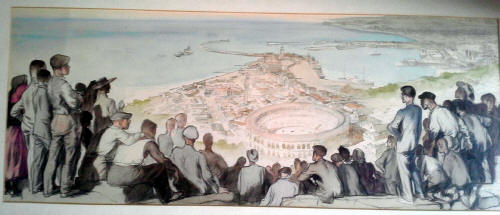 "Scent
of Mystery" water colour story board by Vincent Korda. Picture by
Susan Todd "Scent
of Mystery" water colour story board by Vincent Korda. Picture by
Susan ToddClick to see enlargement THa: How did he fund that? I am referencing this to all the money he got from “Around the World in 80 Days”. How did he finance moving to Ireland and not having a regular job? OMT: That is my guess, and I do not know any of the specifics, and it is an interesting notion that my siblings and I have talked about, because he did not really have any regular income unless there was some residuals that were still coming from other productions that he had made. I imagine what happened, and again I do not know precisely either numerically, specifically, or legally, but my impression is when my grandfather died he was on a good roll. He had just made “Around the World in 80 Days”. I do not know whether other sources of income were available in terms of residuals from Broadway productions, or other properties, or royalties, Todd-AO, and whatever other productions and companies that he had stakes in. My impression was everything was divided between my father and Elizabeth Taylor but how long that lasted or what sort of numbers were involved, I am not sure. My impression, and it really is just an impression, is his inheritance funded his life for a few decades thereafter, or maybe even more. I do not remember the specifics but I remember him mentioning at some point having sold some literal properties, or rights to things - to Elizabeth or Elizabeth’s estate; so there may be some things in addition to whatever residuals were providing income - he would sell off chunks of things. I presume at some point he sold “Around the World in 80 Days” because I do not remember him talking about there still being any income from that. It is a little bit of a mystery to me; he made it a pretty long ride without having to punch a clock at 9 a.m. every day; so fair dues to him - as they say in Ireland. |
|
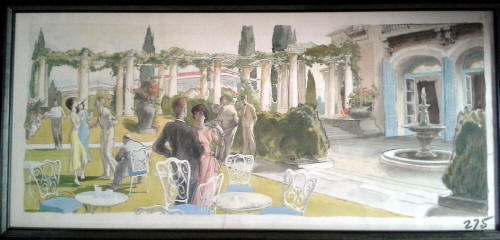 "Scent
of Mystery" water colour story board by Vincent Korda. Picture by
Susan Todd "Scent
of Mystery" water colour story board by Vincent Korda. Picture by
Susan ToddClick to see enlargement THa: Do you remember any of the people working in the office in New York, as I showed you, like Bill Doll. OMT: There is one person there who I think I have met; I remember him; he is Sid Levine. There are three or four names there that I recognize very well; Bill Doll is one of them; I guess he was a publicity or press agent and I am almost certain he continued to work for my father after my grandfather died. There is another name on there who I definitely met. His name is Herman Odell and, if I remember correctly, he was a lawyer and I do not know but I presume some form of entertainment lawyer. I am almost certain he continued to work for my father after my grandfather passed away, and I certainly met him and in fact he went to my sister’s wedding, or we stayed at the same hotel, or something like that. He was quite elderly at that point but I remember being at a dinner with him and he certainly left enough of an impression on my father and in our family life that one of my brothers is named after him. His middle name is officially Odell. His full name is David Odell Todd, but everyone calls him Dell - as he is named after Herman Odell. There may have been a couple of other names I recognize Midori, although I do not remember what function she played, if she was a personal assistant, or some sort of managerial position. I definitely remember hearing her name. That is the sort of instinct; I know the name Bill Doll, he was a press agent. Midori, I know the name. My father spoke quite frequently about his own business, and certainly his father, as I was growing up amidst sheep and cows in rural Ireland. So there was that sort of dissonance in my childhood and I would guess to some degree it was similar although maybe not as dissonant for my older siblings who had more memories and experience of our life in the United States, and my father being a producer and business person, because for me there was this life that he talked about at the dinner table, and these celebrities, and then there was the life we were leading, not even in the village but a little outside of a small village in rural Ireland. |
|
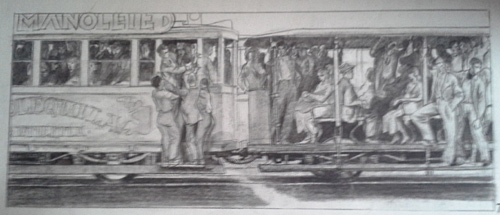 "Scent
of Mystery" water colour story board by Vincent Korda. Picture by
Susan Todd "Scent
of Mystery" water colour story board by Vincent Korda. Picture by
Susan ToddTHa: One of the films your father produced for which he is very famous was the infamous "Holiday In Spain". I do not know if you have seen it, but it is coming out now on DVD and Blu-ray on a re-mastered print. But originally, the film was preceded by a short film, a cartoon, called "The Tale of Old Whiff" – did you ever hear about that? OMT: I was not aware of it, but the most notorious aspect of “Scent of Mystery” - or “Holiday in Spain” as it is now more safely named, is its odours and you may know more than I do about the specifics. I have the impression that the idea was to pump odours through the ventilation system of cinemas where it was shown but it seems it was somewhat problematic for various reasons but as far as “The Tale of Olde Whiff” I am guessing there is a word play if not a sense of smell in that short. But was that a film that my father made? THa: It was a cartoon that was added to “Scent of Mystery” and nobody has heard about it since; it is lost because nobody knows where it is or where the negatives are, the sound or anything. That is why we hoped you could shed some light on it! OMT: No, sorry! Not able to. I shall ask my siblings about that. My oldest brother was in the industry for a while and probably talked more with my father about bits and pieces and items like that so he may have some idea. But beyond that – no. THa: Did your Dad often talk about “Scent of Mystery”? OMT: No, not much and he was really pretty funny about it. I guess you have to have a sense of humour about it in the first instance if you are going to publicize your film. I forget what the tag line was but something like, “First they moved (1895)! Then they talked (1927)! Now they smell!” which in American English something that smells does not smell good. But he did not talk a lot about it. The thing that was perhaps most prevalent in my life was a series of story boards that he gave us as gifts - maybe two or three really amazing water colours. That brought up a little bit about the shooting on location and Denholm Elliott, and these were story boards done by Vincent Korda. I do not know much about him, but had the impression he was a very significant impresario, or person in his own right and that was part of the point my father was emphasizing when giving us these water colour story boards as gifts - saying “this is by Vincent Korda” as if we should note the significance. It is possible my siblings knew more about the significance of who he was and what it meant. I just thought this is a really cool picture! I had one that was set in the Alhambra, and there is another from a scene in the film where Denholm Elliott has his umbrella on a piece of rope and is over a steep drop. My father would talk about shooting in Alicante, or wherever it might be in Spain, and of the experience of shooting in Spain and working with some of these people. However, he was somewhat self-effacing about the art work and how impressive it was. He spoke more about the people he worked with than the film itself or the production – Peter Lorrie, Denholm Elliott, and Vincent Korda and whomever else came to his mind. To some degree I get a little bit turned off by the Celebrity Culture, and the tabloid magazines, but here was a person who was talking about these people he had worked with which meant so much more and which stuck with me. My father did not have a very strong sense of himself as an important celebrity producer; I think it was much more a matter of admiration for what those people had achieved. |
|
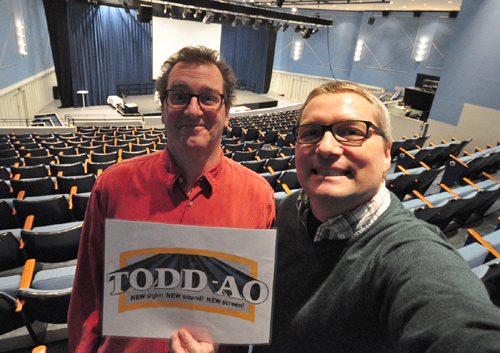 THa: Did you ever see Cinerama? THa: Did you ever see Cinerama? OMT: My first thought is ‘no’, but I find that a little bit hard to believe about myself, and especially because I have heard so much about the Roller-coaster and the Venice footage and it may be really one of those created memories which means I know so much about it, or should know so much about it, that I imagine I have seen it! I do think I have seen the Venice canal sequence, but I really do not know in my poor memory now if I can say, ‘yes’, I remember seeing the Roller-coaster sequence. And what I have seen of the canal sequence, when I think about it now, probably was not in the Cinerama version, it was probably something on a television monitor! So I might actually think I have not seen it in its real format, although my brother and sister went to that screening of “Holiday in Spain” or “Scent of Mystery” in Los Angeles, which I understand was shot and screened in the original Cinerama. THa: That was the digital re-mastered version shown on a digital projector on the big curved screen to simulate the Cinerama. But it is filmed in 70mm. There are stories that the film was in the laboratory actually split up into three strips, and actually shown in a few cinemas. OMT: That is what confused me; I though how could you do that? Are you shooting with three different cameras and then splicing three different pieces of the film. Is that the idea? Or is there some way in which the three cameras are filming …? I never really understood exactly how it worked technically and optically. THa: In Cinerama you shoot with three cameras that are locked together in a block - so the outer cameras are photographing what is on the peripherals of the view – it is called Able, Baker and Charlie – and in the cinemas you have three projectors and you show it basically in the same way; so you have one big screen. Ideally you do not have any join lines, but you always have join lines in Cinerama where the pictures overlap. And if you are a real Cinerama aficionado - a fan of Cinerama - you want to see the join lines. Everyone else complains about the join lines. THa: Your Dad did not talk about “Scent of Mystery” a lot but had a sense of humour about it – and left it behind. OMT: When you asked that question, I heard quite a few stories about the days he was in New York and in his office, names like Bill Doll and Midori and whatnot, but “Scent of Mystery” itself did not come up very often. In fact I do not think he spoke very much about his work. He spoke more about his father’s productions, the Broadway productions, and “Around the World in 80 Days”. THa: Did he talk about Jack Cardiff who directed the film? OMT: I recognize the name and he would have mentioned him some, but not a great deal. It is not someone that I would have thought – “OK, I know all about that person”. Some of my knowledge is based on just the regeneration or re-release of “Scent of Mystery”; I have the hard cover of the publicity that came out with the production and I would have flicked through that and seen it, but I do not remember a lot of specific information about Jack Cardiff although I recognize the name. |
|
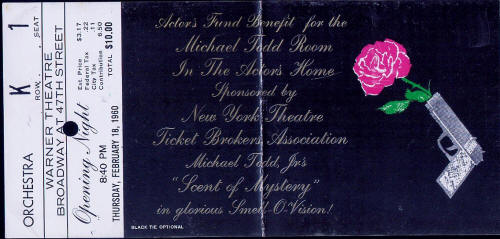 THa: I have touched this briefly in the previous question, but what do
people say when you tell them that Mike Todd Junior was your daddy? And Mike
Todd was your granddad because do people know that? THa: I have touched this briefly in the previous question, but what do
people say when you tell them that Mike Todd Junior was your daddy? And Mike
Todd was your granddad because do people know that?OMT: That is an interesting question, and it has definitely changed in the twenty or so years that I have been an adult and a school teacher. I am not sure how it ever first came up and I was actually really reticent. I would never bring it up, but there were people in my family who would make sure that you knew that early on in their acquaintanceship. That is not the way I approach it. It is really I think, as I suppose anything like celebrity, fame is likely to be very generationally dependent and actually just probably last week my sister said to me, and I know this from teaching teenagers, if you say Elizabeth Taylor to a fifteen year old, a lot of them now do not even know who that is. Ten years ago, there was still the occasional glimmer on the tabloid front page, and maybe that was somewhat to do with her association with Michael Jackson. Michael Todd, as in my grandfather, I think his name was pretty well recognized, and I cannot put a date on it, but can give you one specific example from my twenties: I was with some friends in New York City and there was a big-named nightclub that had a “Mike Todd Room” and on this occasion we were going out and I insisted that I would get into the “Mike Todd Room” free because Mike Todd was my grandfather. So there is some remnant of that and again it is a generational thing; people my age probably do not even know his name, they certainly would know Elizabeth Taylor’s name. I do not know anyone who knows who Mike Todd Junior was - unless they are really in the movie industry and really keen - other than he was Michael Todd’s son. So he got an obituary in the New York Times, but it really was Michael Todd’s son; Michael Todd Junior passed away in rural Ireland. His career, partly by his own volition, or moving to Ireland and stepping away from it, surely did not really carry notoriety or fame. When kids now Google, even in Copenhagen, I have had kids say “oh my goodness, your grandfather was really famous” but that is about as far as it goes in their own mind. Who he was or what he did is fairly gone from current cultural consciousness. One of my brothers did really spend a lot of time thinking and plotting out a screenplay, “The Life of Michael Todd” or some version of that, and my father did write the biography, but I know it did not catch on fire or fascinate the public interest in any great way. Celebrity comes and goes. |
|
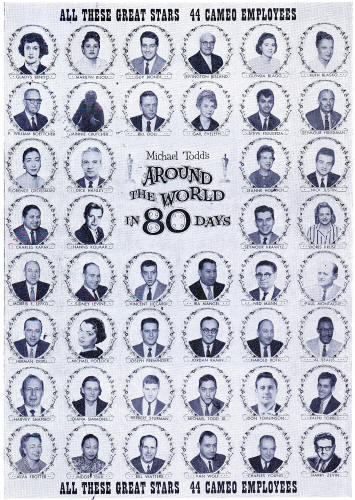 THa: There was some controversy a few years ago about one of the Oscars you
talked about previously. I seem to remember someone selling an Oscar and
that is a big No No in the industry, can you tell me about that? THa: There was some controversy a few years ago about one of the Oscars you
talked about previously. I seem to remember someone selling an Oscar and
that is a big No No in the industry, can you tell me about that?OMT: Yes, I can tell you my version of what I understood to have happened. I really do not know the precise accuracy of this story but my impression is that of the seven or eight Oscars that were on our mantelpiece at some point - having gone through enough of whatever remnants of inheritance there was - my father decided that it would be a good thing to sell one of the Oscars. I think he did sell one of them but I could not tell you which one it was, nor how much he got for it, but I think he also garnered the attention of the Academy of Arts and Motion Pictures and there became a bit of a stink about it. The Academy do not want people to be marketing these things; if you win an Academy award you should be honoured and grateful and let us leave it at that. Certainly somebody who has inherited one by someone else should not be selling it. So I do not really know if there was an actual law suit but I do have the impression the Academy thereafter has put a legal contract with every Academy Award saying that “The Academy has the first right of refusal to buy back this award for one US$ should you ever wish to sell it”. This part of the story gets a bit shady – I think my father tried to sell another of the awards even after they had done that; and I really have no idea if he ever sold it – or if there is now a huge black mark against him in the Academy, or if anyone has ever sold one since. But I do think it might be a little bit funny and ironic that if there is a little bit of notoriety attached to Mike Todd Junior, it might be he is the guy who sold the Academy Award. But I do not know if he was the one to do it first; I just got the impression perhaps he got the attention for doing it first. THa: Where are they now – there were six or seven or eight – he did not sell all of them? OMT: I do not know where they are now. They are no longer on the mantelpiece. That is one of the reasons why I think maybe he tried to sell another; I do not know even if they were originals or just replicas. You know, if my grandfather’s film won all the Academy Awards, and he got one for Best Picture, Best Producer, Set Decoration or whatever the six of them were, they may well have just been replicas that were not worth anything. I do not know where the other ones are since you ask. Something to look into - together with "The Tale of Old Whiff". |
|
 Todd
Clan Christmas card Todd
Clan Christmas card THa: Tell us about how you lived in Ireland, when you moved there - the places you lived. OMT: The first five years we lived in Ireland my father rented a castle in the south east which was the ancestral home of what was called the Dukes of Leinster. The family’s name is McMurrough Kavanagh and Leinster is one of the four provinces of the Republic of Ireland; it is the largest of the provinces and also contains the City and County of Dublin. The home is about eighty or ninety kilometers from the City of Dublin; very, very rural, but a very grand old castle that has a wall surrounding it attached to a village, and the village may be somewhat there in part because the castle was first built there. Later on we moved. My father had a house built a few miles from that village and that itself was also a sort of weird disjunction. It is a very suburban American style house in a field in Ireland. When that house was built, there was none of the ‘McMansions’ that are now dotting the countryside of Ireland, because Ireland had not gone through the economic boom at that point. But there is a similar disjunction or oddity, this American family moving to a castle in rural Ireland, and so I was young enough not to know any different. I am sure my older siblings found it extremely odd. What my father or step mother at that point were thinking about it who knows? But it was odd to have this well-to-do American family living in what was certainly then a really small and provincial village in Ireland. I do remember distinctly at some point, and it was pretty soon after we moved there, and I started going to the local elementary school, where I asked my father something about the issue that most of the kids I went to school with did not change their clothes. They had one outfit for the school week. It was not done to talk about “social class”, and he said “don’t worry about it”. I may have been a little bit older and a little bit more aware of the difference between a poor farmer and a shop keeper, but he said – “We are not in the social system” and he described people who are really poor, and then you have people who are somewhat poor, you have shop keepers and you have professionals, and then there are landowners. But we do not fit in anywhere; we are just outside of the social system in this country. I said OK that makes sense, although it did not to me then, I felt like an oddity in that place. |
|
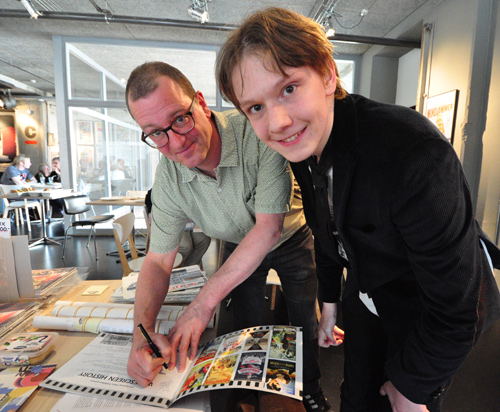 Oliver
doing book signing in Aalborg, 26. April 2014. Image by Thomas Hauerslev Oliver
doing book signing in Aalborg, 26. April 2014. Image by Thomas HauerslevTHa: Living in a castle must be fun when you are in second grade …? OMT: There were a lot amazing things about it. There were hay barns; there was literally a dungeon in the castle, and turrets up on the roof where you can shoot the invading armies; endless fields and stone walls, and also really imposing for a little kid because it is such a grand space with lots of valuable things that you are not supposed to break. There was also an entire wing of the castle that was closed off that my brother and I used to break into and snoop around, finding old bits of armour and swords, cannon balls and all sorts of relics. Yes, really wonderful place for the imagination of a young person, definitely. THa: We are in a Todd-AO cinema as envisioned by your granddaddy, a big screen which was demolished years ago, but it is a big cinema with lots of seats; a huge visceral experience to watch Todd-AO. Did you ever see Todd-AO yourself? OMT: It is similar to me as the question of Cinerama in that it is one of those things that I think I must have but I cannot connect to it. I have some sort of recollections. I certainly heard lots of stories particularly about "Around the World in 80 Days", the premier, the success, the crazy party they held in Madison Square Garden soon after that film got shown, and obviously I was not at any of those things, that was all quite a few years before I was born. But I do have recollections, there is a family photograph which I do not have with me in Copenhagen, but I had in my sitting room when I was living in the United States. It is a picture of my family, my father, mother and the six of their children standing in front of the original Madison Square Garden building, and it has to be somewhere before it got renovated. That is something where I can imagine my father saying OK we are all going into the City and we are going to - and maybe it is Cinerama - maybe it is Todd-AO - but some sort of experience like that which my father would have taken all of us to, but it is a really hazy recollection that I cannot say “yes, I remember seeing any Todd-AO production”. THa: Do you have anything you want to add to this conversation? OMT: It is great that there are people such as yourself who are more than interested but actively keeping the art form alive - whether it is Todd-AO, Cinerama, or 70mm film - and still keeping it going. I was really pleased and somewhat touched by the fact that “Scent of Mystery” got a remake and was shown, and will be again I think at the end of this month in Spain. I think that it is neat that there are people who so appreciate what was produced then. There is a little sort of retro-cool about it, but I think that is a healthy thing, to admire what was innovative then and not lose sight of it as a fairly significant technological or artistic development of its time. Thank you. |
|
|
Go: back
- top - back issues
- news index Updated 22-01-25 |
|
